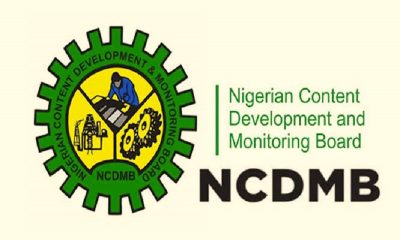Economy
Nigeria’s Oil and Gas Local Content Grows 54%

By Adedapo Adesanya
The local content in Nigeria’s oil and gas sector has experienced a significant surge, recording a rise of about 54 per cent in 2022 compared to 26 per cent in 2017.
This was disclosed by Mr Simbi Wabote, the Executive Secretary of the Nigerian Content Development and Monitoring Board (NCDMB), on Monday during his presentation at the ongoing Nigerian Oil and Gas Energy Week in Abuja.
He disclosed this encouraging development, highlighting the remarkable progress in promoting indigenous industry participation.
During his presentation at the event with the theme Nigerian Content’s Role in Achieving Energy Security, Mr Wabote said that in the last five years, when NCDMB started implementing the Strategic Roadmap, it has more than doubled the level of Nigerian content in the oil and gas industry from 26 per cent in six years ago to 54 per cent in 2022.
Mr Wabote also promised to deliver on his mandate in reaching the target of developing the capacity of the local supply chain for effective and efficient service delivery to the oil and gas industry without compromising standards.
He also encouraged oil and gas industry players to familiarise themselves with the Nigerian Oil and Gas Industry Content Development Act (NOGIC Act) as well as the Nigerian Content Regulations.
He said: “Stakeholders need to read and understand the NOGIC ACT and the Nigerian content regulations guiding local content.”
In terms of manpower in the oil and gas industry, be said it reached 81 reached Nigerian content, while project management was 80 per cent.
Mr Wabote also said that the NCDMB had disbursed a total of $160 million out of the $200 million Nigerian Content Intervention Fund (NCI Fund) to qualified firms.
The NCDMB chief executive said the Board will continue to improve efforts to provide accessible credit for Nigerian oil and gas service companies and community contractors.
He said that the NCDMB is also working to promote relevant and reliable data and statistics and has established a collaborative framework with the National Bureau of Statistics (NBS).
Economy
NASD Unlisted Security Index Climbs 0.88%

By Adedapo Adesanya
The NASD Over-the-Counter (OTC) Securities Exchange maintained its upward trajectory with a further 0.88 per cent rise on Wednesday, March 3.
The expansion increased the NASD Unlisted Security Index (NSI) by 36.94 points to 4,256.41 points from 4,219.47 points, and lifted the market capitalisation by N22.10 billion to N2.546 trillion from Tuesday’s N2.524 trillion.
The six price gainers were responsible for the growth achieved by the unlisted securities market yesterday, with MRS Oil Plc adding N20.00 to trade at N230.00 per unit versus the previous day’s N210.00 per share.
Further, FrieslandCampina Wamco Nigeria Plc surged by N11.07 to N128.83 per share from N117.76 per share, Lagos Building Investment Company (LBIC) Plc grew by 37 Kobo to N4.12 per unit from N3.75 per unit, First Trust Mortgage Bank Plc advanced by 19 Kobo to N2.11 per share from N1.92 per share, Acorn Petroleum Plc rose by 1 Kobo to sell at N18.75 per unit versus the preceding day’s N18.74 per unit, and Acorn Petroleum Plc also gained 1 Kobo rise to sell at N1.35 per share versus N1.34 per share.
It was observed that two securities were in red at midweek, with Central Securities Clearing System (CSCS) Plc down by N1.56 to N82.59 per unit from N84.05 per unit, and Industrial and General Insurance (IGI) Plc down by 2 Kobo to 47 Kobo per share from 49 Kobo per share.
Yesterday, the volume of trades went up by 86.2 per cent to 2.6 million units from 1.4 million units, but the value of transactions deflated by 31.4 per cent to N64.1 million from N93.4 million, and the number of deals declined by 22.0 per cent to 46 deals from 59 deals.
CSCS Plc remained the most traded stock by value (year-to-date) with 36.4 million units valued at N2.2 billion, trailed by Okitipupa Plc with 6.3 million units traded for N1.1 billion, and Geo-Fluids Plc with 122.8 million units transacted for N480.4 million.
Resourcery Plc ended the day as the most traded stock by volume (year-to-date) with 1.05 billion units sold for N408.7 million, followed by Geo-Fluids Plc with 122.8 million units traded for N480.4 million, and CSCS Plc with 36.4 million units worth N2.2 billion.
Economy
Naira Falls to N1,387/$ at Official Market, N1,390/$1 at Parallel Market

By Adedapo Adesanya
For the 11th straight trading session, the Naira closed lower against the United States Dollar in the Nigerian Autonomous Foreign Exchange Market (NAFEX) on Wednesday, March 4.
At the official market, it lost N2.80 or 0.2 per cent against the greenback to close at N1,387.09/$1, i contrast to the N1,384.29/$1 it was traded a day earlier.
It also depreciated against the Pound Sterling in the same market window at midweek by N12.88 to quote at N1,855.10/£1 versus Tuesday’s rate of N1,842.22/£1, and weakened against the Euro by N9.08 to N1,615.27/€1 from N1,606.19/€1.
The Nigerian Naira depreciated against the US Dollar yesterday at the GTBank forex counter by N12 to sell for N1,385/$1 compared with the previous day’s N1,373/$1, and tumbled by N5 in the parallel market to close at N1,390/$1 compared with the preceding day’s N1,385/$1.
The exchange rate has been trending downward for almost two weeks, though it has been resistant to being in panic mode because it is still within its projected N1,350 to N1,450 per Dollar band.
Nigeria’s gross external reserves climbed to $49.693 billion from $49.604 billion, based on the latest data from the Central Bank of Nigeria (CBN).
Meanwhile, the cryptocurrency market recovered after weeks of consolidation, but traders remain divided over whether the move marks a genuine breakout or another trap for late buyers.
Analysts have pointed to heavy overhead supply and positioning in derivatives markets as potential risks, with some suggesting a rally could only attract sellers rather than confirm a sustained recovery.
Dogecoin (DOGE) gained 8.3 per cent to trade at $0.0962, Ethereum (ETH) appreciated by 7.9 per cent to $2,122.87, Bitcoin (BTC) added 6.3 per cent to sell for $72,438.50, Solana (SOL) improved by 6.2 per cent to $90.37, and Cardano (ADA) jumped 5.1 per cent to $0.2733.
Further, Ripple (XRP) rose by 4.9 per cent to $1.41, Binance Coin (BNB) soared by 3.2 per cent to $652.64, and Litecoin (LTC) surged by 2.7 per cent to $56.09, while the US Dollar Tether (USDT) and the US Dollar Coin (USDC) traded flat at $1.00 each.
Economy
Crude Oil Steady Despite Rising Iran War Risks, Shipping Disruption

By Adedapo Adesanya
Crude oil prices were largely unchanged on Wednesday as escalating US and Israel strikes against Iran widened regional tensions and halted shipping through the Strait of Hormuz.
Brent crude was at $81.40 per barrel, while the US West Texas Intermediate (WTI) crude gained 10 cents or 0.1 per cent to trade at $74.66 per barrel.
Despite not much movement in midweek, analysts say prices remain elevated as markets grapple with the prospect of a prolonged war and lingering supply disruptions.
The US government has signalled a four- to five-week campaign, but Iran is seeking to regionalise the conflict, and the crucial Strait of Hormuz chokepoint is effectively shut.
The New York Times reported that operatives from Iran’s Ministry of Intelligence signalled openness to the US Central Intelligence Agency to talks on ending the war.
On Wednesday, US Defence Secretary Pete Hegseth said America was winning the war against Iran and that the US military could fight as long as needed.
While all other options are being explored, forces from both the US and Israel have struck targets across Iran, prompting Iranian retaliatory strikes against energy infrastructure in a region that accounts for just under a third of global oil production.
Iraq, the second-largest crude producer in the Organisation of the Petroleum Exporting Countries (OPEC), has cut output by nearly 1.5 million barrels a day due to storage limits and the lack of an export route.
The US said it was working on plans to secure the Strait of Hormuz to ensure safety for oil tankers amid the war with Iran.
President Donald Trump on Tuesday said the country’s Navy could begin escorting oil tankers through the strait if necessary. He added that he had ordered the US International Development Finance Corporation to provide political risk insurance and financial guarantees for maritime trade in the Gulf.
Meanwhile, countries and companies have begun seeking alternative routes and supplies of crude. India and Indonesia said they were looking for other supplies, while some Chinese refineries were shutting or moving up maintenance plans.
The Energy Information Administration (EIA) said on Wednesday that crude stocks rose by 3.5 million barrels in the last week to their highest in three and a half years.
-

 Feature/OPED6 years ago
Feature/OPED6 years agoDavos was Different this year
-
Travel/Tourism10 years ago
Lagos Seals Western Lodge Hotel In Ikorodu
-

 Showbiz3 years ago
Showbiz3 years agoEstranged Lover Releases Videos of Empress Njamah Bathing
-

 Banking8 years ago
Banking8 years agoSort Codes of GTBank Branches in Nigeria
-

 Economy3 years ago
Economy3 years agoSubsidy Removal: CNG at N130 Per Litre Cheaper Than Petrol—IPMAN
-

 Banking3 years ago
Banking3 years agoSort Codes of UBA Branches in Nigeria
-

 Banking3 years ago
Banking3 years agoFirst Bank Announces Planned Downtime
-

 Sports3 years ago
Sports3 years agoHighest Paid Nigerian Footballer – How Much Do Nigerian Footballers Earn


















